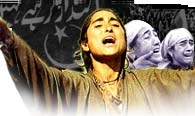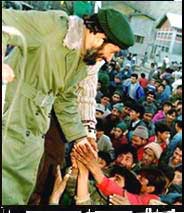As significant as what drove the Pandits out is the question about their future.
Since he returned to power in 1996, Chief Minister Dr Farooq Abdullah had been saying that the migrants should come home. He has promised them 'safe settlements'. But the Pandits aren't biting: like Chamalal Pandita asks, what security can you offer when army camps are being attacked?
And what about the Kashmiri Muslims? Will they welcome their brethren with open arms? Yes, according to prominent separatist leader Shabir Shah. (Click for the earlier interview.)
"Jammu and Kashmir is not a land only for Muslims or only for Hindus or only for Buddhists or only for Sikhs. It is homeland to all its indigenous people, a land where ALL religions have always and will always coexist," the Jammu and Kashmir Democratic Freedom Party chief said in an email. "Pandits are part and parcel of Kashmir. This is their home too."
Speak to the commoner in Srinagar and you get the same answer: They are our brothers; let them come back.
But press a little, scratch the surface... and you find that there are many who differ. "We DON'T want them here... They are traitors!" says one such.
This gulf between the Hindus and Muslims is more economic and social than communal. Like elsewhere in India, in Kashmir too the Brahmins were rigid followers of the caste system. In fact, one reason why Islam took such deep roots among the Hindus in the valley between the 15th and 18th century was the Brahmins' highhandedness. They held positions of power and were economically better off than the rest.
Notes historian Dr Ishaq Khan in his book Kashmir's transition to Islam: "...the members of the low castes must have been tempted to take up Islam in order to free themselves from the bondage of the Brahmin..."
The difference, especially in money matters, was in evidence right through the centuries. Wrote journalist Gwasha Nath Kaul in 1924: "Ninety per cent of Muslim houses in Srinagar were mortgaged to Hindu sahukars (money lenders)."
Before Kashmir's accession to India, the Pandits were identified with the Dogra rule; after that, with India. "It was a Pandit leader who raised the slogan 'Kashmir for Kashmiris' first, in 1920," Dr Khan says, explaining why certain sections feel betrayed by the Pandits. "Despite that the Pandits did not support the dream of azaadi."
Another reason for the antagonism is economic. Muslims have filled numerous job vacancies that arose after the Pandits fled. Plus, there have been many cases where they have taken over the properties left behind by the Brahmins.
"Naturally the Muslims feel threatened," says social activist and lawyer Parvez Imroz.
A political hurdle too bars the return of Pandits. Thanks to its cadres who helped set up relief camps for the Pandits, the BJP has reaped a healthy harvest from the minority community in the last few elections. Now it is in their electoral interest that these people do not return.
Panun Kashmir's stand is that the Pandits will return only if India 'reverses the cleansing process'. And this, it says, can be achieved by creating a Union territory in the valley.
"We have asked for the area east of the Jhelum," says Dr Charangoo. "That would be the district of Anantnag and parts of Srinagar, Baramulla and Pulwama."
Is that practical? "As practical as solving the Kashmir issue," he replies.
Shabir Shah strongly opposes the demand. "It is a communal idea, is against the Kashmiri ethos, and will only make things worse for everybody," he comments.
He believes that the alienation the two communities feel can be sorted out through dialogue and interaction -- a belief that Usmaan Ahmad of the United States-based Council for Independent Kashmir shares.
So how much longer? You get a plethora of answers, ranging from 'soon' to 'never'.
History offers some hope: King Zain-ud-din is known to have persuaded the Pandits who fled the tyranny of his predecessor in the early 15th century to return home...
Day 7, December 16: The UN stand




